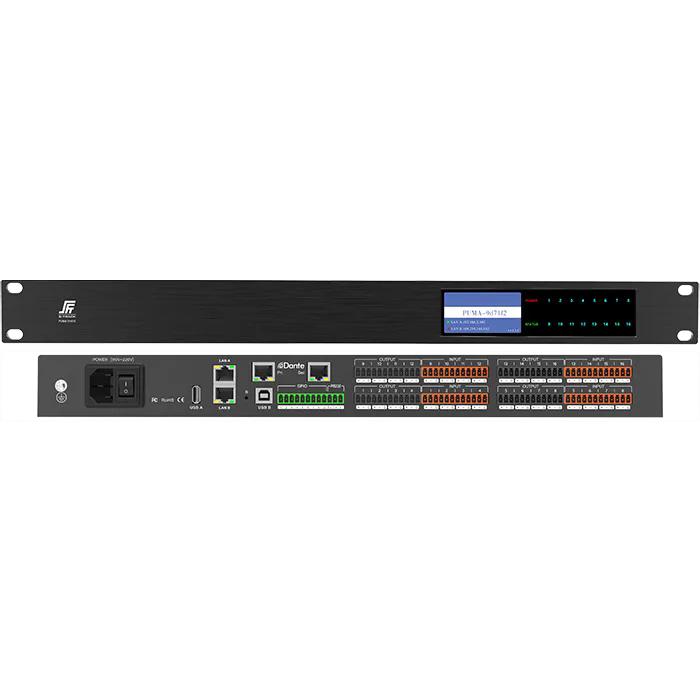Unlocking the Potential of Audio Processors: Revolutionizing Sound Quality and Performance
2024-08-19
In the ever-evolving world of audio technology, audio processors play a pivotal role in shaping and enhancing sound quality. Whether you're a music producer, audio engineer, or an enthusiast looking to get the best out of your audio equipment, understanding audio processors and their capabilities can significantly elevate your listening experience. In this blog, we will delve into what audio processors are, their key features, benefits, applications, and the future trends shaping this essential technology.
What is an Audio Processor?
An audio processor is a device or a software application designed to manipulate, enhance, and manage audio signals. It can handle a range of functions, including equalization, compression, noise reduction, spatial effects, and more. By processing audio signals, these devices or programs help achieve the desired sound quality and characteristics for various applications, from professional music production to everyday listening experiences.
Key Features of Audio Processors
1. Equalization (EQ): EQ allows for the adjustment of different frequency bands within an audio signal. This feature is essential for balancing sound and shaping the tonal quality of the audio.
2. Compression: Compression controls the dynamic range of an audio signal by reducing the volume of louder sounds and boosting quieter ones. This helps to create a more consistent and polished sound.
3. Reverb and Delay: Reverb adds a sense of space and depth to audio, simulating different acoustic environments. Delay effects repeat audio signals at set intervals, creating echoes and enhancing the spatial quality of the sound.
4. Noise Reduction: This feature minimizes unwanted background noise and interference, improving the clarity and quality of the audio signal.
5. Spatial Processing: Spatial processors enhance the stereo or surround sound experience by manipulating the placement and movement of audio signals within a three-dimensional space.
6. Dynamic Processing: This includes tools like expanders and limiters that manage the dynamic range of audio signals, ensuring that audio remains within desired levels and avoids distortion.
7. Audio Mixing and Routing: Audio processors often include mixing and routing capabilities, allowing users to combine multiple audio sources and direct them to different outputs or channels.
Benefits of Audio Processors
1. Enhanced Sound Quality: By fine-tuning various aspects of audio signals, audio processors help achieve superior sound quality, whether it's for music production, broadcasting, or personal listening.
2. Greater Control: Audio processors provide detailed control over audio parameters, allowing users to customize and perfect their sound to meet specific needs and preferences.
3. Versatility: Modern audio processors offer a wide range of functions and effects, making them versatile tools for various applications, from studio recording to live sound reinforcement.
4. Improved Clarity: Features like noise reduction and EQ enhance the clarity of audio signals, making it easier to hear and appreciate the details within the sound.
5. Creative Possibilities: Audio processors enable creative sound design by offering tools and effects that can transform and shape audio in innovative ways.
6. Professional Quality: For audio professionals, high-quality audio processors are essential for achieving the polished and professional sound required in music, film, and broadcasting.
Applications of Audio Processors
1. Music Production: In music studios, audio processors are used for mixing and mastering tracks, applying effects, and refining sound quality. They help producers and engineers achieve the desired sonic characteristics for various genres and styles.
2. Broadcasting: Audio processors are crucial in radio and television broadcasting, where they are used to ensure consistent sound quality, manage dynamic range, and enhance audio clarity.
3. Live Sound Reinforcement: In live sound settings, audio processors are employed to control and enhance sound for concerts, events, and performances. They help manage feedback, balance sound levels, and create immersive audio experiences.
4. Film and TV Production: Audio processors are used in film and TV post-production to clean up dialogue, add sound effects, and create a cohesive audio mix that complements the visual elements.
5. Consumer Electronics: Audio processors are also found in consumer devices such as home theater systems, headphones, and smartphones, where they enhance audio playback and user experience.
6. Gaming: In gaming, audio processors are used to create immersive soundscapes, manage spatial audio, and provide clear communication in multiplayer games.
Future Trends and Innovations
The field of audio processing is continually advancing, with several emerging trends and innovations shaping its future:
1. Artificial Intelligence (AI) Integration: AI-powered audio processors are becoming more prevalent, offering advanced features like automated mixing, intelligent noise reduction, and real-time sound analysis.
2. Enhanced Spatial Audio: Advances in spatial audio technology are creating more immersive listening experiences, with precise positioning and movement of sound in three-dimensional spaces.
3. Real-Time Processing: Innovations in real-time audio processing are enabling more immediate and dynamic adjustments, improving live sound reinforcement and interactive applications.
4. Cloud-Based Audio Processing: Cloud-based solutions are providing remote access to audio processing tools and resources, facilitating collaboration and flexibility in audio production.
5. Customization and Personalization: Increasingly sophisticated audio processors are allowing for greater customization and personalization of sound, catering to individual preferences and specific use cases.
6. Integration with Other Technologies: Audio processors are being integrated with other technologies, such as virtual reality (VR) and augmented reality (AR), to enhance the overall sensory experience.
Conclusion
Audio processors are indispensable tools that transform and elevate the quality of audio across various applications. By offering precise control, creative possibilities, and enhanced sound quality, these devices or software applications play a crucial role in music production, broadcasting, live sound, and more. As technology continues to advance, the capabilities and applications of audio processors will expand, paving the way for even more innovative and immersive audio experiences. Understanding and leveraging the power of audio processors can significantly enhance your auditory world, whether you're a professional or simply a passionate listener.



